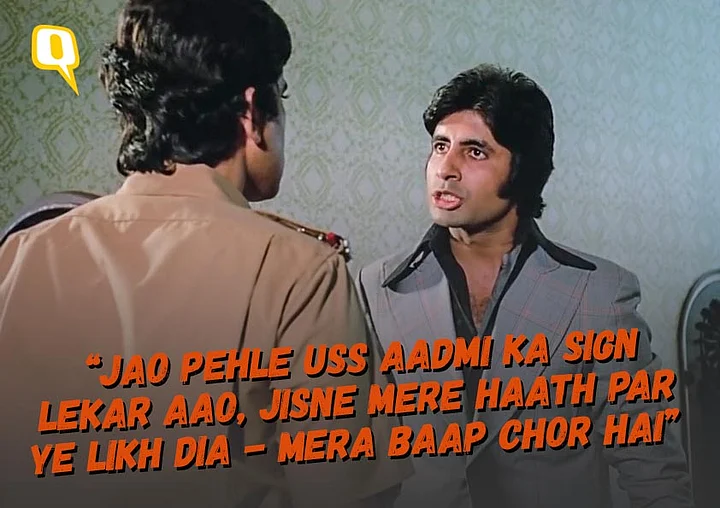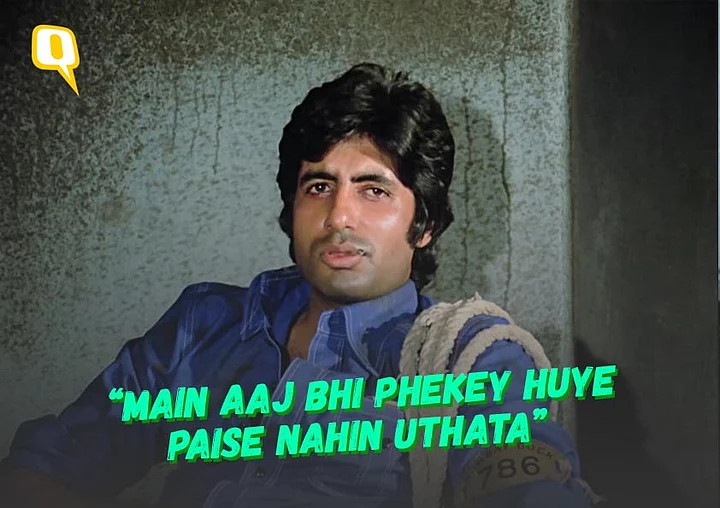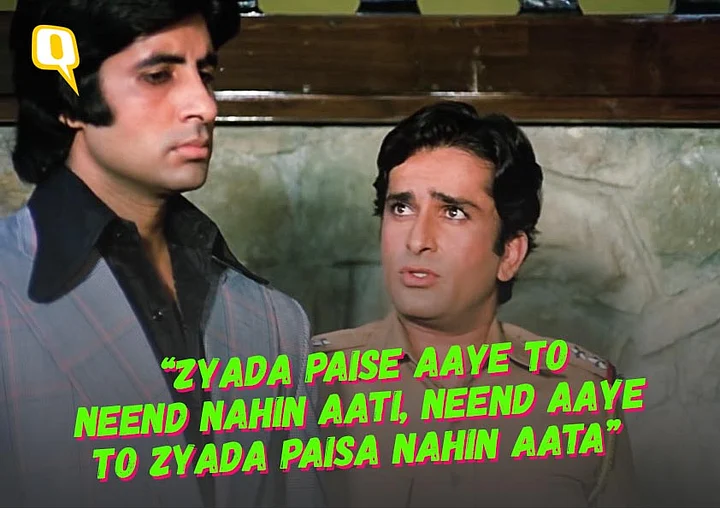(Shashi Kapoor breathed his last on 4 December. This review of Deewar (1975), by 24-year-old Aaqib, was first published on 30 May 2017. It has been reposted from The Quint's archives to mark the passing of the veteran actor)
“You haven’t seen Deewar?” people shouted in surprise, when I told them I would be watching it for the first time. It was almost as if I refused to believe in the concept of evolution at some Darwinian conference. Eyes were rolled, and friendships soured.
Deewar released 42 years ago. The only reference I had from this movie was the epic ‘Mere pas maa hai’ dialogue, which went from cult to cliché to a cinema classic.
I started watching the movie while my dad switched on the IPL. The cricket match ended around the time when the movie’s climax sequence was on. Yes, it’s a really long movie.
In the opening credits, Yash Chopra’s name as the director came as a personal surprise. I knew him as the man behind Shah Rukh Khan’s modern love stories such as Veer Zaara, or the forgetful Jab Tak Hai Jaan. Is he the same man who would later bring Switzerland to our movies, or us closer to the lofty ideas of romance, I wondered. This was another genre, another age, another feeling.
Laying The Bricks
The story begins with Anand Verma, a factory union leader who’s fighting oppressive laws and low wages through a labour strike. He’s a man of values, and a role model for his kids Ravi and Vijay (the names are as 1970s as they could get). His wife Sumitra Devi is happy that everybody in the house is happy.
Unhappy with the ‘anti-factory’ activities, the factory owner kidnaps Anand’s family and forces him to accept all the conditions and cancel the strike. Anand bows down, and signs his acceptance in one of Bollywood’s original ‘ransomware’ attacks.
Anand’s surrender to the factory owner’s terms brings the labour union against him and his family. Shamed and booed, Anand flees, leaving his family behind. A smart move? Probably not. But this decision dictated the lives of the other major leads.
Ravi, Vijay and their maa Sumitra Devi move to Mumbai, hoping for better times. But the big city comes with its own set of challenges.
Cementing the Great Divide
Deewar offers a comprehensive study of contrasting choices. Vijay turns into a rebel against fate. He refuses to go to school, and offers to work instead so that his brother Ravi could go to school. He refuses to go inside temples because he doesn’t need anything from bhagwaan. There’s a sense of distrust in Vijay about everything.
He’s willing to trade moral values for quick money. Vijay blames lack of money for the condition they are in. Hence, to make up for the lost respect, he goes bitter and becomes a criminal working with underworld agents.
Viay, as a character, sees Amitabh Bachchan in the ‘Angry Young Man’ avatar, I had always imagined him to be on-screen. His unabashed revenge against injustice is only countered by his brother Ravi, who lies on the opposite end of the spectrum.
Ravi is also a victim of the system. He lands a job, and gets removed when a powerful manager refers his relative for the same position.
Ravi faces innumerable rejections in job interviews. His unemployment frustrates him, but he stays persistent in his efforts. Ravi looks for a stable job to end his suffering and finally lands one as a police officer. His first case is to go after the crimes of his brother. Ravi gets confused and refuses to take the case.
During a sequence, Ravi shoots a boy to stop a robbery. He discovers later that the ‘stolen item’ was a loaf of bread. Dejected, he reaches out to the family of the victim, where the boy’s father (AK Hangal) gives Ravi a crash course in social responsibilities. Ravi decides to take the case of his brother.
Another contrast is of the women. Veena (Neetu Singh) is the daughter of a senior police officer who cheerleads Ravi into finding the perfect job for him. On the other hand, Anita (Parveen Babi) meets Vijay in a bar, smokes, drinks and even sleeps with him. No points for guessing who dies in the end.
The brothers try to grow in the eyes of their mother, while also struggling to grow in their respective lives. Their maa becomes a point of conflict, and a reason to bring them together too.
Plastering Mother India 2.0
This was probably the first Nirupa Roy movie I saw in its entirety. She smiles only in a few frames of the film. Otherwise, she maintains a look which appears to be a mix of disappointment and anger. It was almost as if somebody told her that she’d need a mandatory Aadhaar card to avail all the public benefits. Oh…wait.
She dotes on her sons, and constructs her whole life around them.
Sumitra Devi is constantly torn between the diverging ways of her two sons. Though she understood that whatever Vijay does is for her, she's heartbroken when she learns that Vijay is a smuggler, and leaves him to live with Ravi.
The same mother, when she learns about Vijay’s spiralling criminal ways, hands Ravi his revolver, and says:
She goes total badass, and immediately goes to a temple where she had promised to meet Vijay.
Sumitra Devi defends the decision saying “Aurat apna farz nibha chuki, ab maa apna farz nibhaane jaa rahi hai.”
Spoiler alert: Vijay gets shot by Ravi, yet reaches the temple, where the mother is waiting. He dies in her lap. The mother wails.
And Ravi stands there with this expression.
Rich Coating of Dialogues
Before watching this movie, I knew a couple of songs and dialogues from this film, but I had no idea that they were from this one film. I was in complete awe of writers Salim-Javed for the craft they brought to the screen in the form of various punchlines, and the actors for the convincing delivery of the same.
At a time when the memorable dialogues in recent years are in the league of “Hum tum mein itne chhed karenge ki confuse ho jaoge, saans kaahan se lein aur paadein kahaan se”, Deewar’s “Main aaj bhi pheke huye paise nahin uthaata” comes as a genuinely solid whistle-worthy moment.
It’s the same movie where the dialogue “Tum mujhe wahan dhund rahe thhe, aur main tumhara yahan intezaar kar raha tha” reverberates in Amitabh’s baritone, which I have often used on my cab-wallahs when the GPS takes them to a different location.
Or the usual refrain to ask a friend if they’re happy with their appraisal, by mimicking “Aaj khush to bohot hoge tum”, complete with Bachchan’s signature haayeein sound.
Here are a few of my picks from the movie:
- 01/03

- 02/03

- 03/03

Painted with Melodies
There was a sense of Déjà vu when I heard one of the tracks in the film. A couple of lines into the song ‘Keh Dun Tumhe...’ , I expected an English rap to begin, which didn’t because I was instinctively connecting this with a remix version released in the early 2000s.
The longevity of the original song and its melody is a testimony to the music by RD Burman and lyrics by Sahir Ludhianvi.
It was sung by Kishore Kumar and Asha Bhosle. There is also the other number which I often heard during long road trips in the family car, ‘Maine Tujhe Manga Tujhe Paaya Hai...’.
The songs though add little to the flow of the movie, and appear abruptly. A little research told me that Deewar was supposed to be without songs, and they were added later at producer Gulshan Rai’s insistence.
One exception would be Ursula Vaz’s I’m falling in love with a stranger, which comes as a jazz track playing in the background of Vijay and Anita’s first meeting. I was a little surprised to hear a completely English track in a Bollywood film then, but it fit perfectly.
The Wall of Fame
I have seen the film once, and I feel this deserves to be seen a couple of times more. Not only for the dialogues, but the many layers of characters and stories this movie has managed to pack in a commercial Bollywood format.
Deewar feels longer than its 2 hour 52 minutes of runtime. A few scenes linger for a while, and there are other instances where the action jumps from one scene to another in a blink. The film is a masterpiece in storytelling.
While the modern Yash Raj movies I grew up watching may be worth their weight in gold, I think I’ve discovered another gem from Yash Chopra. This one glitters a little bit more.



